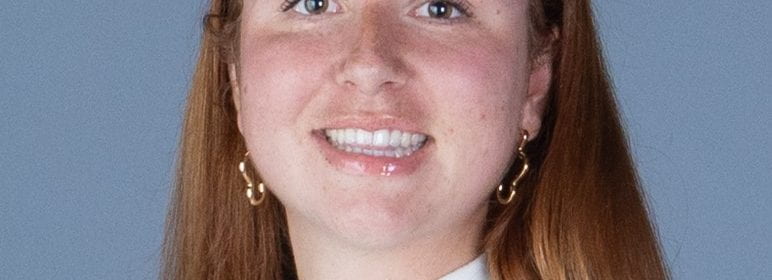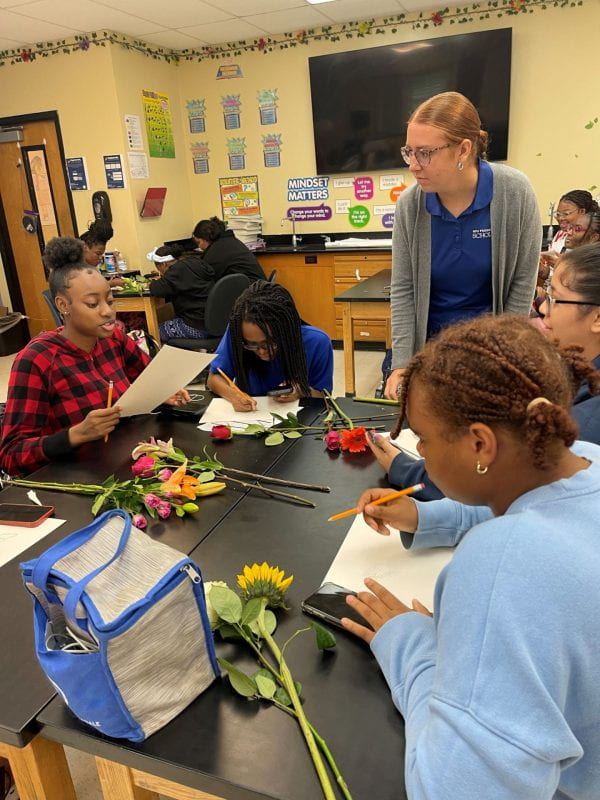Student Research Spotlight: Charlee Musiakiewicz (Education)


Charlee Musiakiewicz is a second year Elementary Education major with a minor in Research Studies. Charlee is planning to obtain a bachelor’s degree by the end of her third year and master’s degree, also from NSU, by the end of her fourth year. Charlee’s research efforts were also recently highlighted in NSU’s student-run newspaper, The Current (link below).
https://www.makomedia.nova.edu/2024/02/22/student-brings-stem-education-to-high-school-girls/
Briefly talk me through your research journey from your 1st day at NSU to today.
It is my love of research and the research opportunities available here that led me to NSU. I have been in the Razor’s Edge Scholars Program since my freshman year, and now serve on the Executive Board. My experiences to date—generally and as part of Razor’s Edge—have only intensified my passion for research. The unique coursework involved in the program has provided me with the knowledge and technical skills needed to succeed and blaze new trails in the field. And the people with whom I had the privilege of working have been truly inspiring. The combination of devoted upperclassmen and professors have instilled in me a new appreciation for that research is not only important but also limitless.
Although my current research is just the beginning of my research efforts here at NSU, this project has given me the opportunity to expand my horizons and embark on facing new challenges. Most recently, I have been writing a proposal, under the mentorship of Hui Fang Huang (Angie) Su, Ed.D., Professor in the Abraham S. Fischler College of Education and School of Criminal Justice, for the Discovery Research PreK-12 Grant from the National Science Foundation. I can only hope to learn from this experience and continue to achieve new accomplishments as the project progresses.

I am currently working on a project aimed at studying the effects of STEM education on high school females, most of whom are minorities. It has been proven that a degree in any STEM-related field opens doors for better job opportunities and rewarding, higher-paying careers. But it is also well-established that the resources devoted to fueling interest of the
under-represented classes in the field are woefully insufficient. The study was designed to inspire young women to pursue a career in STEM. A group of forty high school females were tasked to complete a pre-intervention survey on their skill and interest level on a Likert scale with regard to math, science, and engineering/technology. The research team then designed seven-interventions that incorporate hands-on STEM lessons and activities. The disciplines of intervention include, Chemistry & Physics, Technology Design & Computer Science, Physics & Mathematics, Arts Integration, and Marine Biology, and are all taught by experts in the field. Through these interventions and a field trip to the NSU campus, we hope to give the participants insight as to the possibilities that lie ahead of them. We are scheduled to administer the post-intervention surveys after all the interventions are complete. We will then compare the data from the pre- and post- surveys and assess the impact that the STEM program has on their confidence and interest in pursuing a STEM-based degree.
What made you interested in the type of research you are currently working on?
While I am thrilled and honored to be involved in the foregoing project, my journey to get here has been one of many twists and turns. I originally came to NSU to pursue my lifelong passion for marine biology and extension of my prior research experience in a marine science-based high school curriculum and as a volunteer at an aquarium. But soon after arriving on campus, my horizons expanded and I developed an even greater passion for education. As much as I always envisioned working on a marine-based research project in some remote region of the world, I am troubled by the gap between the knowledge that is being gained across the research world and the children who would benefit most from learning about it. I also sense a growing need for teachers with not only the ability to instruct, but also the desire to inspire kids to become the pioneers of our next frontier. For these reasons, I have shifted my focus from becoming a field researcher in the life sciences to teaching the younger generations the beauty, wonder, and importance of research across all disciplines and domains.
What made you decide to work with your current research mentor?
Working with Dr. Su was a no-brainer. She embodies every quality that you want in a researcher. She is innovative, intelligent, fearless, and open-minded. Her professional accomplishments are, in many respects, unparalleled. And, perhaps most important of all, she treats me as her partner or teammate in all our endeavors. We work together to achieve our goals and objectives. She has been, and continues to be, an incredible role model and inspiration. I can only hope to follow in her footsteps.
How does this work relate to your future career goals and what do you plan to do next?
My research work to date aligns perfectly with my future goals and objectives. As previously mentioned, I have shifted my course of study from marine biology to education and plan on obtaining a master’s degree in Science Education so that I can make a positive and far-reaching impact on our children and bridge the divide between the field and the classroom. I also intend to pursue a PhD in the learning sciences. Working with Dr. Su has underscored for me the importance of continuing to foster widespread interest in STEM-based studies and the ability to have the best of both of worlds—pursuing my own research interests and sharing my wisdom, passion, and skills with others.
How has NSU helped you pursue and/or achieve personal and professional goals you have set for yourself? Any specific NSU resources used that you would like to mention?
It is hard to put my gratitude for NSU into words. The University has guaranteed me a spot for in its master’s degree program, allowed me to create my own book club, Razor Reads, surrounded me with like-minded students and colleagues, given me a second family in the form of Razor’s Edge Research and, perhaps most of all, connected me with a teams of professors from whom I have gained invaluable knowledge and with whom I have developed life-long relationships. Though they each have a unique set of skills and expertise, they have all truly inspired me.
What advice do you have for other students interested in getting involved in research?
One of the biggest pieces of advice that I have for other students who are interested in getting involved in research is to keep an open mind. While it is admirable to be dedicated to your current interests and goals and have what you believe to be a full-proof plan, don’t be blind to the world of opportunities that surround you. Research is the gateway to combining multiple disciplines and interests. Use it to be boundless and explore.